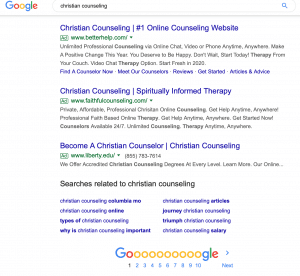Keyword Research Tools for Therapists
One of the most common questions I get is, “How do I figure out what keywords to target on my website?” I think there are two important topics to cover here: Where to look for keywords and how to choose which ones to target. Today, I’ll touch on the where to look and then we’ll touch on how to choose which keyword to go with in another blog post.
First Lesson: Potential clients may not search for the terms you think they’re searching for.
I remember the first time someone asked me what search terms my clients would be looking for. I distinctly remember saying, “Prolonged Exposure.” I had a whole list, and I can’t remember what else was on it. But my point is this: my list was full of technical terms my clients simply were not using!
On a less obvious note….a lot of couples therapists will tell me the most important keyword they want to rank for is “couples counseling.” The interesting thing about this is that in most areas of the country, more people are searching for “marriage counseling.” And by “more,” I mean usually more than double! Now, it varies depending on region whether “couples counseling” or “couples therapy” comes in second. But it’s a great example of why I always recommend beginning any good SEO plan with a little keyword research!
Free Places to Begin Keyword Research
The truth is that I didn’t actually pay for a keyword research tool until I was about six months into my business as an SEO
consultant. There are some great FREE keyword research tools out there you can use. So, let’s start with those free tools!
Ask your friends
The important thing here is to ask people in your life who are NOT mental health experts. Instead, I recommend finding someone in your life who is similar to your ideal client and asking what they would enter into a search engine if they were looking for a therapist! So, if you really like working with depressed teenagers, ask a friend who has a teenager who has struggled with depression. If you offer divorce discernment counseling, as a friend who recently went through a divorce.
Your intake paperwork: What words have your ideal clients already used?
Think of a few clients you have really enjoyed working with. Now, go look at your intake paperwork. Preferably look at any section that has an open ended question such as, “Why are you coming to counseling right now?” Look for common themes. One of the participants in our first “Top of Search Engines” SEO workshop found this to be the most helpful suggestion of all. She pulled up her EHR and realized as she went through that there were a few phrases that kept coming up over and over again in that intake paperwork so we began to really target those phrases on her page.
 A Basic Google Search
A Basic Google Search
Because Google truly does care about the client experience, when you type a search into Google at the bottom of the page they offer a list of related search topics that you might be interested in searching for. Luckily for us, they choose the keywords they recommend at the bottom based on search terms people actually use. So, this can be a helpful place to begin your keyword research.
In the example here, I might use this information to then suggest this therapist write a blog post titled “Types of Christian Counseling” (Christian informed versus more biblically based perhaps?) and “Why is it Important to see a Christian Counselor.”
Google Adwords Planning Tool
I personally don’t use Google Adwords, but if you do, you know their keyword planning tool is free. It’s really meant to help you plan keywords for Google Adwords campaigns. Therefore, it will have some extra information such as the average cost per click that you really don’t need if working on organic SEO. However, the searches per month in your area can be very useful!
Ubersuggests for Keyword Research
Ubersuggests is a free tool (at the time of this writing) from Neil Patel. Let’s be honest, I like all of the SEO tools Neil Patel provides. This is a great free tool! You type in one keyword you are considering and receive a list of related keywords. From here, you want to look at the volume and SEO difficulty level.
Google Trends
I generally use Google Trends more when something unusual is going on that I think might impact how people are searching. For example, when the #MeToo movement started or when the Coronavirus hit. Because traditional keyword tools are based off an average of data for about a year, they might not help you catch sudden changes. In these instances, Google Trends can help you more quickly identify the impact of what is happening in the world.
Paid SEO Keyword Research Tools
At this point, I honestly rely very heavily on my favorite paid keyword research tool. I’ve tried out a couple and generally recommend either KWFinder or SEMrush if you go with a paid tool. The best thing about these paid tools is that you can search what keywords people are looking for in your specific area. This is important, because I’ve found that sometimes the best keywords to target varies greatly by area.
I recommend most people go with KWFinder if they’re going to pay for one tool. In fact, that’s what my staff generally use. I find it to be reasonably priced and easy to use.
There are also “fancier” tools as well that do more than just keyword research. I really like SEMrush. It allows you to pull keywords from multiple different places, do really in depth research on the keywords your competitors are targeting, track your keywords, etc. all in one place. Then, it also lets you do all sorts of other things like keeping track of your backlinks.
There are a lot of other great tools out there. I’ve tried a few and they all have advantages/disadvantages. However, these are the two that I personally pay for and feel like I get a really good value with.

What are the best keyword research tools?
There are a lot of great tools out there! In addition to casual research such as asking friends or looking at your intake paperwork, here is a summary list of the tools I typically recommend for keyword research:
- Google Search Console
- Google Adwords Planner
- Ubersuggests
- Google Trends
- KWFinder
- Semrush
What do I do with my keywords?
Once you’ve come up with a list of keywords that you believe your ideal clients are using, it’s time to use those to start optimizing your website! There are a lot of different places you can place these keywords on your website including page titles, subheadings, in the text, meta descriptions and more. Here’s an article with 6 places on your website you can use your keywords to improve your SEO!
It’s also good to know that your keyword list is probably going to be pretty fluid for awhile. What I mean is that the more you work on your SEO, the more likely you are to revise your list. So, you don’t have to worry about getting the “perfect” list together right now. It’s ok to add a new area you want to target (i.e. instead of just your suburb, targeting your entire area), add a few variations of your initial keywords, etc.
Ready to get your website to the top of Google?
SEO doesn’t have to be complicated. Simplified SEO Consulting seeks to make SEO less stressful. We offer a variety of SEO services designed to meet your needs as a small business owner and walk you through the steps it takes to get your website ranking well on search engines. If you’re too busy and don’t have time to optimize your website, we offer the popular Done for You SEO Services. With this package, our team of SEO specialists will optimize your page for you. If you are the do-it-yourself type, we can help you too. We also have DIY Online SEO courses for people who are really motivated to learn their own SEO or a 12 Week SEO Intensive business owners wanting to learn to optimize their own sites, but also looking for support every step of the way.
Contact us with specific questions, or book a free SEO Consultation to decide which service is best for your practice.

SEO Search Engine Optimization Marketing




Leave a Reply
Want to join the discussion?Feel free to contribute!